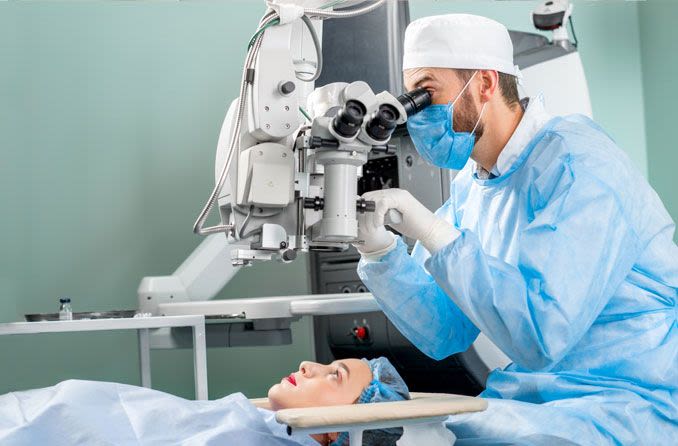Cataract surgery video

After the age of 50, you may develop a cataract. You may eventually need surgery if you begin to see starbursts around lights at night or if objects are hazy during the day. This video describes the outpatient procedure that is done to remove a cataract. A transcription of the video is below.
Watch this video about how cataract surgery works.
What To Expect During Cataract Surgery
Many people older than 50 develop cataracts that, in the beginning, just need to be watched. Your eye doctor will monitor your vision and let you know if your cataracts are getting worse. Also, you may need cataract surgery if you start to see starbursts around lights at night or hazy images during the day.
Once the decision is made, cataract surgery typically is done in a clinic and does not require an overnight hospital stay. In fact, an uncomplicated cataract procedure usually takes less than 10 minutes.
Prior to surgery, your eye will be dilated with eye drops. Next, your surgeon will numb your eye with drops or an injection of anesthesia. A special surgical tool then will be used to make at least one small incision into the eye. A fluid substance called viscoelastic is injected into the eye to help stabilize the interior and maintain eye pressure.
A hollow tip then is inserted into the eye in a common procedure known as phacoemulsification. With this method, ultrasonic energy travels through the phaco tip to break apart the cataract. As the cataract is being shattered, the phaco tip suctions out the broken fragments.
Keep in mind that the cataract is your eye's own natural lens that has become cloudy. So when the cataract is removed, so is your lens. This means you will need an artificial lens as a replacement. A usually folded intraocular lens is inserted and opens into the cavity where your eye's original lens once was located.
Most people don't require sutures after cataract surgery, because the wound seals itself. Instead, a bandage is applied, and a shield is taped over the eye to protect it. For extra protection, you'll probably need to wear your eye shield while sleeping, for about a week.
You'll also need to use eye drops for a few days after a procedure. It takes about a month for your eye to heal completely. But you'll probably notice much sharper vision within a day or so.
Cataract surgery is one of the safest and most common medical procedures. Although risks are associated with any surgery, most people report great outcomes. However, you will need to be monitored in follow-up eye exams, to make sure there are no complications.
Page published on Wednesday, February 27, 2019






